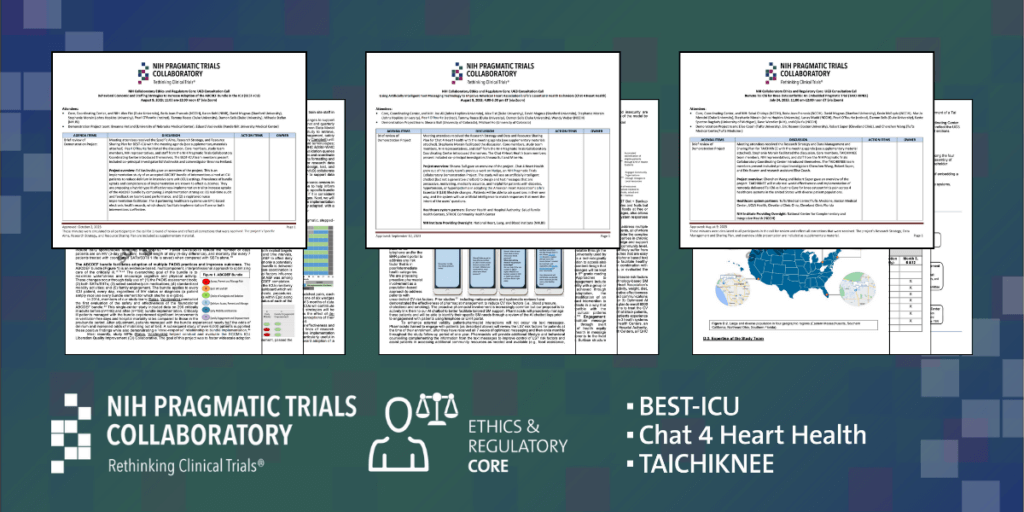 Ethics and regulatory onboarding documentation for the NIH Pragmatic Trials Collaboratory’s newest NIH Collaboratory Trials is now available. The documents include meeting minutes and supplementary materials summarizing recent discussions of ethics and regulatory issues associated with the BEST-ICU, Chat 4 Heart Health, and TAICHIKNEE studies.
Ethics and regulatory onboarding documentation for the NIH Pragmatic Trials Collaboratory’s newest NIH Collaboratory Trials is now available. The documents include meeting minutes and supplementary materials summarizing recent discussions of ethics and regulatory issues associated with the BEST-ICU, Chat 4 Heart Health, and TAICHIKNEE studies.
The consultations took place by video conference and included representation from the studies’ principal investigators, members of the NIH Collaboratory’s Ethics and Regulatory Core, NIH staff, and NIH Collaboratory Coordinating Center personnel. All of the projects are in their 1-year planning phase.
BEST-ICU will explore the prevention of health impairments exacerbated by health disparities in the intensive care unit (ICU) through the application of the ABCDEF bundle, a multicomponent, evidence-based intervention to improve team-based care. The objective of the study is to evaluate 2 strategies grounded in behavioral economic theory and implementation science to increase ABCDEF bundle adoption and, in turn, address known health disparities in the ICU.
- Learn more about BEST-ICU.
- View the ethics and regulatory documentation for BEST-ICU.
Chat 4 Heart Health will use a patient-level randomized pragmatic trial to test the comparative effectiveness of 3 text messaging delivery strategies that have been shown to improve individuals’ self-management health behaviors, including physical activity and medication adherence. The study findings will provide evidence regarding the best population-based strategy for universal delivery to engage all patients with health disparities in self-management to improve the American Heart Association’s “Life’s Essential 8” measures for improving and maintaining cardiovascular health.
- Learn more about Chat 4 Heart Health.
- View the ethics and regulatory documentation for Chat 4 Heart Health.
TAICHIKNEE will compare the effects of web-based tai chi interventions versus routine care for individuals experiencing knee pain due to osteoarthritis. The practice of tai chi integrates physical, psychosocial, and behavioral components and has exhibited clinically significant improvements in chronic knee osteoarthritis pain conditions. The results of the study will inform widespread adoption of mind-body approaches for knee osteoarthritis, which affects more than 32.5 million individuals in the United States, across healthcare systems.
- Learn more about TAICHIKNEE.
- View the ethics and regulatory documentation for TAICHIKNEE.
Ethics and regulatory documentation for all of the NIH Collaboratory Trials is available on our Data and Resource Sharing page.


